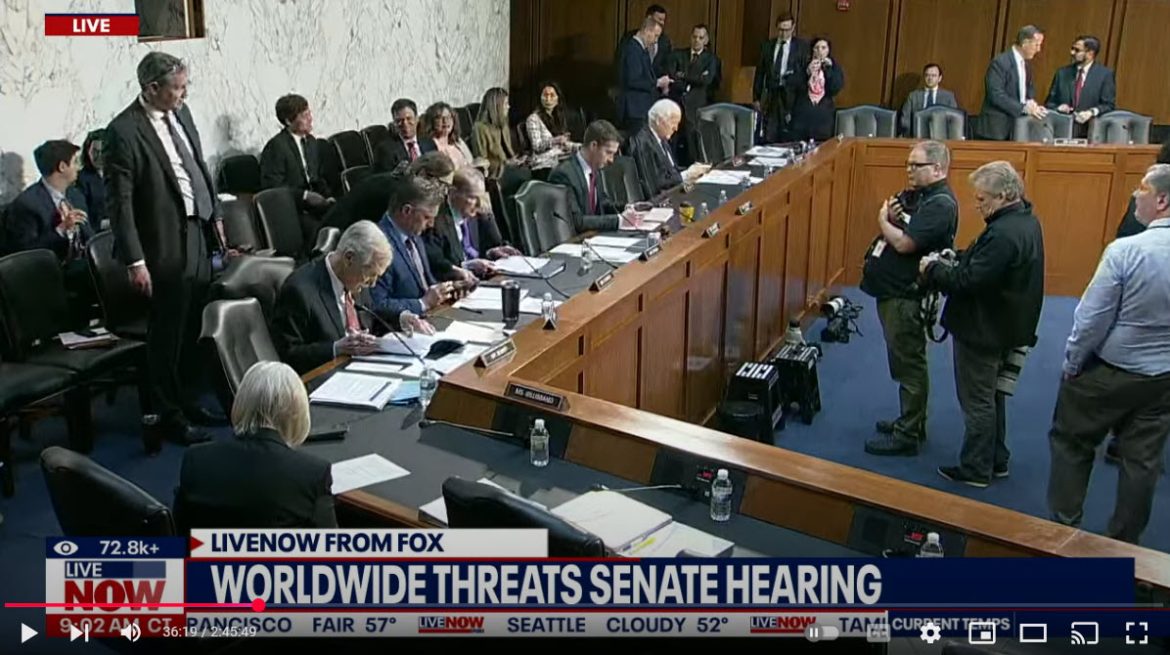A U.S. Senate Intelligence Committee hearing on global threats to national security is thrown into chaos today as lawmakers aggressively question Trump administration officials over a bombshell leak involving an encrypted group chat allegedly discussing military action in Yemen. The testimony, meant to cover broader international threats, is overshadowed by the fallout from claims that a journalist was mistakenly included in a sensitive Signal conversation.
Jeffrey Goldberg, editor-in-chief of The Atlantic, reveals earlier this week that he was added to a group chat on the encrypted messaging app Signal that appeared to include top-ranking Trump officials — including Director of National Intelligence Tulsi Gabbard, Secretary of State Marco Rubio, Vice President JD Vance, and National Security Adviser Mike Waltz. The chat allegedly included discussions about plans to strike Houthi targets in Yemen, prompting fears of a serious breach of operational security.
Democratic senators, including Virginia’s Mark Warner, Arizona’s Mark Kelly, and Oregon’s Ron Wyden, take the lead in grilling officials about the incident during the live hearing. Warner accuses the Trump administration of systemic carelessness with national security information, stating that this was “not a one-off” mistake but part of a broader pattern. He presses Gabbard on whether she was a participant in the Signal group, citing a past post of hers on X (formerly Twitter), where she stated that the unauthorized release of classified material is a criminal offense.
Gabbard refuses to confirm her participation in the chat, dodging multiple pointed questions. When Warner pivots to CIA Director John Ratcliffe, he is met with a similar lack of clarity. Meanwhile, FBI Director Kash Patel also declines to elaborate on whether an investigation into the leak is underway.
Senator Kelly presses both Gabbard and Ratcliffe on the gravity of including a journalist in an internal chat that could be perceived as touching on military planning. Goldberg, for his part, has stated that while no explicit war plans were laid out in the messages he saw, the context of the conversation strongly implied discussion of strikes on Houthi targets — details that have not been officially denied or confirmed by the administration.
The White House, through Press Secretary Karoline Leavitt, insists in a morning post on X that “no classified information” was shared and that “no war plans were discussed.” Leavitt characterizes the inclusion of Goldberg in the chat as a “regrettable clerical error” and stresses that the Signal chat was not an official government communications channel.
President Donald Trump, in an interview with NBC News, defends National Security Adviser Mike Waltz, who is reported to have mistakenly included Goldberg in the group chat. “Mike has learned a lesson,” Trump says, brushing off concerns about the potential national security implications.
Senator Wyden, however, is not satisfied. He calls the use of Signal for government war planning “reckless and dangerous” and demands the immediate resignation of both Waltz and Secretary of Defense Robert O’Brien. Wyden also calls for a formal criminal investigation into whether the discussions violated federal law governing the handling of classified military information.
In response to the scandal, Republicans are largely silent, though some, like Fox News contributor Pete Hegseth, defend the administration’s stance. Hegseth argues in a televised segment that the leak is being exaggerated by the media to undermine legitimate national security efforts against Iranian-backed militias in Yemen.
The timing of this controversy is especially critical. The United States has been escalating its involvement in the Red Sea, launching precision strikes against Houthi rebel sites following continued attacks on international shipping lanes. The Houthis, an Iran-aligned militant group, have expanded their regional influence amid Yemen’s ongoing civil war, frequently clashing with Saudi and U.S. military assets.
Historically, U.S. operations in Yemen have sparked debate over transparency and oversight. Past administrations, including those under Obama and Biden, have faced criticism for drone strikes and covert operations in the region. But the accidental inclusion of a civilian journalist in a discussion about potential military actions marks a new chapter in the debate over how digital tools like Signal are used — or misused — at the highest levels of government.
As the committee concludes its public hearing, lawmakers announce plans for a classified session to continue the inquiry. The Department of Justice and the Office of the Director of National Intelligence are both expected to launch internal reviews. Meanwhile, public confidence in the Trump administration’s handling of secure communications appears to be eroding as questions mount about how much information, if any, may have been compromised.
Source Links:
- Full Hearing: Tulsi Gabbard, Kash Patel testify on Worldwide Threats
- Hegseth slams journalist, defends efforts against Houthis amid bombshell leaks investigation
- Exchange between Tulsi Gabbard and Sen. Warner turns heated amid leaked war plans scandal



